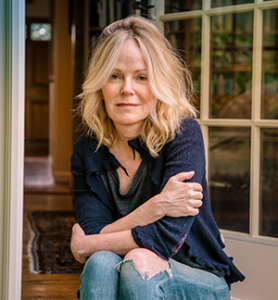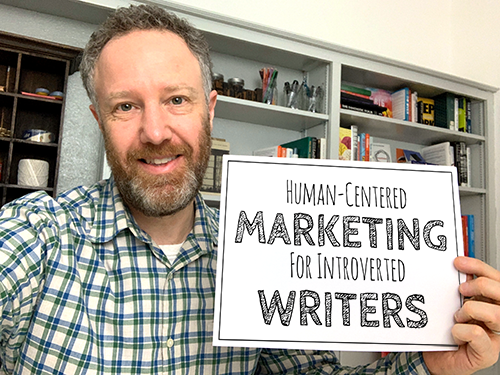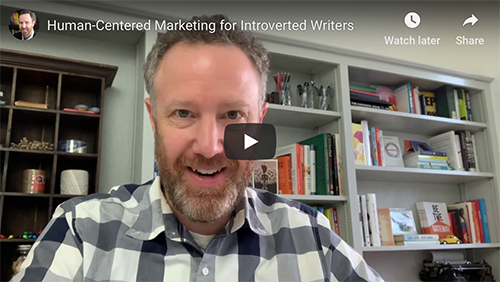I spent this past week helping 700+ authors better understand author website essentials.
In the group there were lots of conversations and questions. It was a great reminder of how confusing it can be to be an author trying to be public with their work, and how easy it is to step into common pitfalls:
- It’s easy to focus too much on technology, not enough on communicating with other human beings. While I absolutely understand that there is a learning curve when it comes to creating a website, I think the more important skill to master is to better communicate with your ideal readers, and develop a trusting relationship with them. What you say on your website and how you use it is critical to its effectiveness. For the technology: keep it simple, so that it doesn’t get in the way of communication and trust.
- Many people are nervous about claiming their identity as writers. I hear this one a lot. For instance, I will speak to a writer who has had more than one book published by a respected publisher, and they will say, “But I’m not really an author.” To many writers, creating a website may feel that they are bragging. For so many reasons, I strongly encourage anyone who writes to claim their identity as a writer. A website is just one way to do that.
- Too often, writers wait (and wait and wait) for the “perfect” moment to launch. I hear this a lot from writers who resist talking about their writing: “I don’t have a book out yet, what would a website even say.” In other words: they hide. They think there is some perfect time to “launch” their website or their platform as an author. That perfect time is always right now.
- Many writers have a fear of success and/or suffer from impostor syndrome. A website highlights the “public” side of “publishing,” which can make someone really nervous. The result? Many writers avoid creating their website, and thus a primary way they will be found or connect w/ someone. It’s like LinkedIn: when is the last time you looked at or updated your profile? When is the last time you Googled yourself? A website can come to represent the fear that many writers have about being public with their writing.
- It’s difficult to resist getting sucked into “best practices” and trends. In my book, Be the Gateway, I encourage writers to avoid best practices. Now, I’m not unaware that basic tutorials for skills you don’t yet know can be wildly helpful. But too often, I see people become overwhelmed by following trends. For instance: “I’m building a juicy lead magnet to grow my email list!” Or, “I was told I have to blog, ugh. But I’m going to do it anyway.” Or, “Websites are dead. Newsletters are dead. Blogging is dead. It’s all about Instagram Stories right now!” These types of things can make the idea of developing an author platform all feel like scary work. Instead, it should be a joy. One way to encourage that is to not become overwhelmed with marketing trends and “best practices.”
To the writers I worked with this week, my advice was always: keep it simple. Focus on how to best communicate what you write and why, and how to develop trust with readers.
But I know the advice I shared can only help someone so much. Oftentimes, the best way to move forward is to work with someone directly so that you can build the website together.
I created a new program to do exactly that. If you want to launch or improve your website, please considering joining me for this 4-week program where I will give you direct feedback and advice, and we will develop a customized plan for your website. I’m only opening this up to 15 people. I provide lots of personal attention, so I strictly limit enrollment. If this sounds interesting to you, you can find more information (and register!) here.
The writers I have been working with this past week have inspired me. Each of them showed up to invest in their creative vision, and connect it to the lives of other human beings. This is timeless work, and an opportunity each of us has each day.
Now, I know pretty much nothing about fashion, the fashion industry, or Karl Lagerfeld himself. But in reading his obituary this week (by writer Vanessa Friedman in the New York Times.), I was struck by the persistence of his creative vision. I printed this out and hung it on the wall of my studio:
“In his 80s, when most of his peers were retiring to their yachts or country estates, he was designing an average of 14 new collections a year. “Ideas come to you when you work,” he said backstage before a Fendi show at age 83. As a result, Mr. Lagerfeld never stopped creating. Though rumors often circulated that Mr. Lagerfeld was sick and about to retire, he never did. He had a lifetime contract with both Chanel and Fendi, and he exercised it. “Please don’t say I work hard. Nobody is forced to do this job, and if they don’t like it they should do another one. People buy dresses to be happy, not to hear about somebody who suffered over a piece of taffeta.”
To all of you showing up to your writing and sharing it with the world, I just want to end by saying: thank you.
-Dan
P.S.: My newest podcast is now live: “I was allowing people to talk instead of me.” Inside the Creative Shift of Comedian and Author Nina G

 I try to dig into this topic with successful creators I speak to in my podcast.
I try to dig into this topic with successful creators I speak to in my podcast.  One of my favorite quotes from a writer talking about the success and the creative process comes from Dani Shapiro:
One of my favorite quotes from a writer talking about the success and the creative process comes from Dani Shapiro: 

